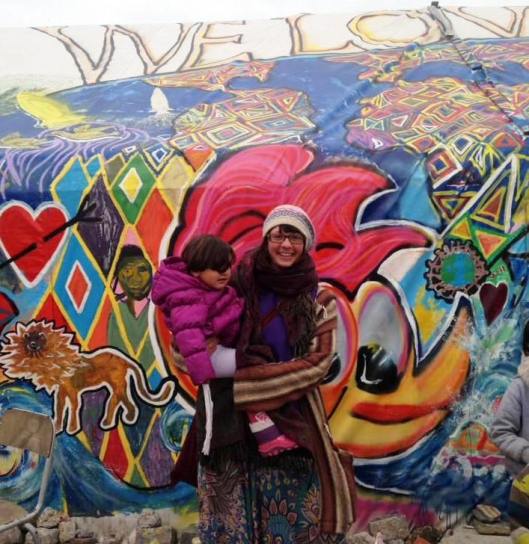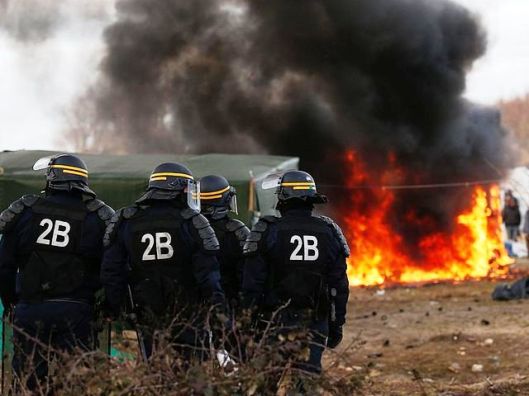What’s it like to do humanitarian work in a refugee camp? And why would anyone want to go there? Having recently spent time as a volunteer in Europe’s biggest camp, Felicity Rose stopped off for a break to talk about her experience.
It’s Felicity Rose’s first visit to Mojacar. The trip had been intended as a quiet holiday-come-family reunion, but it must have come as a bit of a shock – the seaside resort is a world away from the suffering she witnessed barely weeks ago working as a volunteer in one of the world’s most notorious refugee camps: the Calais jungle.
We sit for a chat outside a bar in the hill-top village. Wrapped in a shawl to keep out the chill, she recounts her time working with autistic children in Brighton, and with Indian tribes and Australian aborigines, but her tone changes when she talks about her experiences in northern France. “I thought I was pretty prepared for what I was doing until I arrived in Calais.
“I saw some horrific things. I’d watch fights as people tried to get out and saw them getting tear-gassed by the police and fires going off as I was teaching the children.”
The world watched as the drama unfolded in Calais earlier this month, when the last vestiges of what had once been intended as a temporary staging post for migrants was demolished. At its height, the camp was home to more than 8,000 migrants, according to the Help Refugees association, but the dire conditions sparked riots and a diplomatic row between the UK and France. The endless stream of negative news coming from the jungle also had a profound impact on public opinion in Britain. From the fear of jihadist terrorists infiltrating the site, to assaults on lorry drivers and even the rape of a female interpreter at the camp just as it was being dismantled the reports ensured there was little public sympathy for migrants.
But the problem is not going away. The United Nations high commissioner has said the world is witnessing the highest levels of displacement on record, and estimates that 65.3 million people have so far been forced from their homes – 21.3 million of whom are refugees.

The crisis requires governments to provide solutions on a grand scale, but it’s the volunteers who will be on the front line. In Calais there was an army of about 300 such people, hardly enough to cope – so who would want to be one? A fashion designer by profession, Ms Rose was effectively set up for life in her early 20s, but she walked away from a glittering career and a huge salary 10 years ago after seeing how workers at a garment factory in China were being exploited.
“I saw people hunched over rickety stalls working long hours in appalling conditions,” she says. For many, the incident would have been shrugged off as an inevitable consequence of having a fast-growing economy – and it still fails to explain why she made such a life-changing decision.
“I hate injustice and racism,” she explains. “I hate the fact that people judge others by the way they look and where they come from.”
Her principles cut no ice with her family, who could not understand why she had thrown her career away, but she says she has no regrets. “Once your eyes have been opened you cannot shut them again – you can’t walk with blinkers on.”
When she first arrived at the camp it was in the middle of the night. “I would never recommend anyone to just turn up, because you don’t know what you’re walking into. It’s like any society, only intensified. You’ll find amazingly beautiful people – the majority are – but there is a lot of desperation and it’s also a male-oriented place. Anything can happen inside.”
At first she began teaching English to Eritrean and Sudanese men, but she quickly “burned out”. She admits sexism was prevalent and on occasion an obstacle to teaching, which included – of all things – unexpected marriage proposals. “I was nice and polite about it and they were as well, so it was never a major problem, I would simply find them a male teacher or an older female one to continue teaching them.”
I mention the tabloid reports about young men who were allegedly passing themselves off as children in order to obtain refugee status. “A lot of those children look a lot older than they are because they’re exhausted, they’ve suffered trauma and have been travelling for months – some of them looked 20 but were in fact 14.
“One kid who was 16 had lost his parents at the age of seven and been sent to prison twice in Sudan for stealing food. He spent five days travelling from Libya in a truck full of sheep and was kept as a slave by people who tried to kill him because he couldn’t pay them.
“When he fled on a boat, out of 355 people only 55 survived. The first bit of humanity he got when he reached Europe was to be fingerprinted.”
Her voice quivers as she recounts the boy’s story. She accuses both the UK and French governments of aggravating the problem by failing to recognise the site officially. “By not having refugee camp status, there aren’t the trained professionals you need to support the people in the camp as well as the volunteers, many of whom end up suffering from post traumatic stress disorder (PTSD).”

I suggest that no European country wants the stigma of having a refugee camp within its borders. “You can’t stop it happening, there are already satellite camps going up all around northern France again.”
She is also highly dismissive of the tabloid claims that refugees are just jihadists-in-waiting. “People who are running away from Afghanistan aren’t terrorists, they had their mothers, brothers and sisters killed by the Taliban, or they were running away from their own families who were Taliban.”
Her ideals could be dismissed as a convenient way to mask her own prejudices, but she sticks to her guns – it’s people, not borders, that matter. To make her point she says it was not all gloom and doom in Calais, as the better side of human nature often shone through. “There were female freedom fighters from Kurdistan who were amazing individuals. Some of the most incredible food I’ve ever eaten was in the camp. Singing in a choir and live feeding the concert to London was another amazing moment, as was hearing about the 15-year-old kid you’d been with who had been allowed to go to the UK.”
Next year, she plans to go to a refugee camp in Jordan, which has taken in more refugees than any other country (1.4 million, according to the UN high commission), and then to another camp in Palestine, but won’t say when or where for fear that the Israeli authorities will prevent her from entering the country (“they won’t let you in if you’re doing humanitarian work in Palestine”).
Jumping from the frying pan into the fire comes to mind. I ask how she psyches herself up before embarking on a new mission, and despite everything she has said it still comes as a shock when she admits she’s suffering from PTSD. So why do it? “I was recently told a native American story about a forest fire. All the animals flee except for a humming bird which keeps collecting water in its small beak to put on this big fire. An animal watching says ‘Why do it? You’re not going to make any difference’, to which the humming bird replies, ‘I do what I can’.”